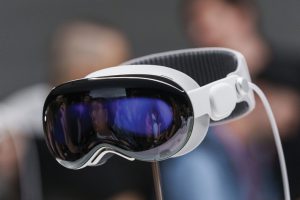BLOOMBERG
Apple Inc is ramping up production of the Vision Pro mixed-reality headset, setting the stage for a launch by February, according to people with knowledge of the matter.
Production of the new headset is running at full speed at facilities in China and has been for several weeks, according to the people, who asked not to be identified because the information is private. The goal is for customer-bound units to be ready by the end of January, with the retail debut planned for the following month, the people said.
The company sent an email to software developers encouraging them to “get ready” for the Vision Pro by testing their apps with the latest tools and sending their software to Apple for feedback. It’s another sign of an approaching release.
The rollout will be Apple’s most complex product launch yet, requiring entirely new sales strategies and equipment. The headset has customised components that need to be assembled and boxed up at the point of sale. It’s also a delicate process. If the Vision Pro isn’t fitted to a user’s head correctly, the device won’t show content properly and may feel extra heavy.
The Vision Pro marks Apple’s first new product category since it began selling smartwatches in 2015. The company has the added pressure of selling consumers on a still-novel concept: mixed reality, which melds virtual and augmented reality. Meta Platforms Inc currently leads the market, but its headsets have struggled to gain mainstream acceptance.
Apple is focused on making a good first impression. That includes sprucing up its retail stores, which will make room for inventory and new fixtures for the $3,500 device. In addition to stocking up on headsets, stores will need accessories like head straps, light seals and prescription lenses.
The Vision Pro’s multiple sizes and configurations will necessitate more storage space. And Apple will need new demonstration areas and places for employees to box up the headset with correctly sized accessories.
Last-minute production hiccups or other snags could, of course, push back the planned timeline. A spokeswoman for Cupertino, California-based Apple declined to comment.
In an effort to quickly get stores up to speed, Apple is sending at least two staffers from each of its retail outlets to its headquarters next month for training. The two-day sessions begin the first week of January and will happen in waves over the course of several days. Those employees will then manage sales of the device at their stores and teach peers how to market the product.
At the training sessions in Cupertino, retail employees will be taught how the Vision Pro functions and which features to highlight in conversations with potential buyers. They’ll learn how to attach the headband, optional prescription lenses and the light seal, which keeps outside light from hurting the experience.
But they’ll also need to learn new types of etiquette, such as how to place a device on a person’s head and fit cushions around the face while keeping the customer comfortable. Apple is planning an app for its devices that can scan customers’ heads in order to determine which band and light seal they should use. But retail employees will need to confirm that the app’s recommendations are right during the sale.
When the company rolled out the Apple Watch eight years ago, it held two media events to tout the device prior to its release. That’s unlikely to happen with the Vision Pro. After unveiling the product at its developers conference in June, Apple is expected to highlight any additional features on its website.
There are some possible reasons for this more muted release. For one, the Vision Pro is out of reach for many consumers given its hefty price and will initially only be available in the US. Shoppers also may balk at the two-hour battery life and the weight of the product, which some testers have found to be uncomfortable.
It’s also complex to manufacture. So if consumers do clamor for the device, Apple may find itself in a position where it can’t make enough units for several months. The headset includes two ultrahigh-resolution displays, two processors and multiple external cameras. And all of those components have to fit into a curved shape that needs to be built without imperfections.
The Vision Pro is just the first of what Apple hopes is an increasingly successful line of mixed-reality products. The company is already working on a models that will be more comfortable and lower cost, which could help the concept catch on.
Beyond selling the device to consumers, Apple looks to target two key areas: corporate customers and schools. But that’s no sure thing. Microsoft Corp, Magic Leap Inc and other headset makers have struggled to gain traction in those markets. The hope is that the Vision Pro, like the Apple Watch did with wristwatches, can get customers to take a fresh look at the idea.
The company is also already developing the next version of the device’s operating system, visionOS. This software should arrive later in 2024, along with operating systems tied to Apple’s other major devices.
“There’s so much more to come,” Apple said in its note to developers Wednesday. “And we can’t wait to see what the next year brings.”
 The Gulf Time Newspaper One of the finest business newspapers in the UAE brought to you by our professional writers and editors.
The Gulf Time Newspaper One of the finest business newspapers in the UAE brought to you by our professional writers and editors.
